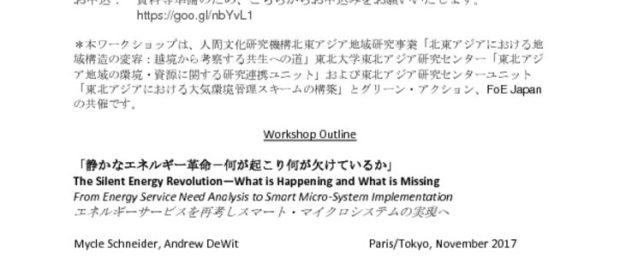12月10日:「静かなエネルギー革命-何が起こり何が欠けているか」
「静かなエネルギー革命-何が起こり何が欠けているか」
-エネルギーサービスを再考しスマート・マイクロシステムの実現へ-
日時:2017年12月10日(日)15:30~18:00
場所:環境エネルギー政策研究所(四ツ谷駅より徒歩8分)
http://www.isep.or.jp/about/access
話題提供:マイケル・シュナイダー(国際エネルギーアドバイザーカウンシル代表)、アンドリュー・デウィット(立教大学経済学部教授)
言語:英語・日本語(逐次通訳あり)
対象:テーマについて相互ディスカッションを希望する人
内容:下記参照
参加費:1000円(学生500円)
お申込:資料等準備のため、こちらからお申込みをお願いいたします。
https://goo.gl/nbYvL1
*本ワークショップは、人間文化研究機構北東アジア地域研究事業「北東アジアにおける地域構造の変容:越境から考察する共生への道」東北大学東北アジア研究センター「東北アジア地域の環境・資源に関する研究連携ユニット」および東北アジア研究センターユニット「東北アジアにおける大気環境管理スキームの構築」とグリーン・アクション、FoE Japanの共催です。
Workshop Outline
「静かなエネルギー革命-何が起こり何が欠けているか」
The Silent Energy Revolution—What is Happening and What is Missing
From Energy Service Need Analysis to Smart Micro-System Implementation
エネルギーサービスを再考しスマート・マイクロシステムの実現へ
Mycle Schneider, Andrew DeWit Paris/Tokyo, November 2017
Nobody needs kilowatt-hours or barrels of oil. What people need are basic energy services like cooked food, heating/cooling, lighting, mobility, communication and motor force.
私たちが必要としているのは電力そのものや石油そのものではない。
必要なのは、料理や暖房や冷房、移動やコミュニケーション、動力に必要な基本的なエネルギーサービスである。
However, the energy-policy debate continues to focus on how to generate and/or how to save energy. Terms like “rural electrification” suggest that it is enough to provide people with power plugs to solve energy issues.
しかしながら、エネルギー政策の議論はいまだに発電方法や省エネ方法にばかり注目している。「田舎の電化」などという言葉は電源さえあればエネルギー問題を解決できると言っているようなものだ。
In France, the most nuclear country in the world (by percentage of nuclear in the power production), one in five households is officially “energy poor”. Every French residence is—of course—”electrified”. People are simply too poor to pay for power. So they are cold in winter and sweating in summer. In the UK, about 9,000 excess winter deaths in a single year have been identified as linked to a lack of appropriate energy services—heating, in this case.
世界の原子力大国フランスでは、5世帯に1世帯は「エネルギー貧困」の状態だ。すべてのフランスの市民はもちろん「電化」している。人々は単に貧困のためにエネルギーコストを十分に支払うことができず、冬は凍え夏は暑さに苦しんでいる。
イギリスでは年間9000人以上がエネルギー(暖房)不足により死亡している。
Something is wrong. While the success of renewable energies in many countries is breathtaking—system prices have dropped to levels that can now compete with most of the traditional electricity generating technologies in many places around the planet—energy poverty is growing fast.
何かが間違っている。再生可能エネルギーの成功が多くの国で目を見張る成果をあげ、多くの国で再エネ設備価格が従来エネルギー技術と十分競争できるほどに下がってきている一方で、エネルギー貧困が急速に増加しているのだ。
Are small, community-based systems a viable approach to the challenge? Are smart technologies and concepts readily available for mass rollout? What are experiences in other countries? What is the situation in Japan?
小規模のコミュニティーベースのシステムは問題解決のための現実的な手段となりうるだろうか。スマート・テクノロジーとコンセプトは一般に普及することは可能だろうか。他国での経験と日本の現状は何だろうか。
——-
This workshop is meant for people that wish to interact with the presenters and try to identify, extract, develop bits and pieces they can use in their own professional environment.
The workshop will be led by Mycle Schneider, Founding Board Member and Spokesperson of the International Energy Advisory Council (IEAC) and Andrew DeWit, Professor at the School of Economic Policy Studies, Rikkyo University (see bios hereafter)
ダウンロード:静かなエネルギー革命-何が起こり何が欠けているか(PDF)
171210_Tokyo_EnergyWorkshop

